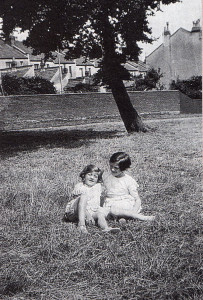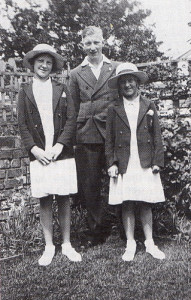
OUR house was a very busy one – six of us boys and girls plus Mum and Dad, so often it was a noisy one, too. Mum had three children before the Great War and three after, so really we were two families. Mum said she didn’t know why she had us last three, for we were much more trouble!
My brother was good at falling into ponds and being escorted home by the police, and he also kept pet mice in his bedroom. My sister and I were always traipsing home late from dances in the blackout. Dad would go down the road looking for us, but gave up as he needed his sleep.
Our front room, like many then, was used only on special occasions, but how that room was transformed at Christmas! A near ceiling-height tree was hung with glittering baubles and tinsel, candles tied painstakingly to various branches. When they were lit, the room was bathed in a flickering, golden glow, but they were blown out reluctantly after while in case they set fire to the green and red decorations. One year, when my brother dug up a tree in the forest, he was chased by the gamekeeper.
There was a glowing fire in the grate, where the nut shells also gradually built up, and side table with bowls of fruit, chocolates, dates, figs and, of course, mum’s delicious Christmas cake. Many carols were sung around the piano, and they were often echoed by The Salvation Army out in the road, singing by the glow of a lantern.
The middle room was where we had our meals and took part in lively discussions on topical matters.
We all came home from work at different times, so the cloth and the teapot never seemed to be off the table.
We’d all sit around the fire listening to the radio, or playing cards, skittles or draughts, hoping it wouldn’t be our turn to get the next lot of coal in!
The mirror hung over the fireplace, but when my sister and I put our make-up on Dad, trying to read his newspaper and get close to the fire, would move it to another wall.
Timmy, the peaceful cat, liked sleeping on top of the clock while Ginger, the battling warrior, would be outside scrapping. We often wondered what was left of the other cat! A glasshouse adjoined the back of the house, and one night Ginger leaped off the bedroom sill and went straight through the roof – landing on all fours, unhurt and very surprised! When Dad saw the hole, Ginger was very lucky to see the light of another day!

Dad’s prized geraniums were in a row on the shelf. When a strange dog was brought in, Ginger was so terrified he leaped across the top so speedily that not a petal was broken!
Ivor, our lovely old Airedale, liked to butt the coalman into the shed and then stop him from leaving the house again!
Toby, a loveable scamp of later years, would go missing for hours, then bring all the rubbish home, he dug holes in the garden, and tore up Dad’s vest and his spectacle case. Our three goldfish in a tank on the sill seemed to go round and round for many years.
Neither was Dad aroused when Mum put his dinner to heat in the oven and forgot to ignite the gas. Dad came away with singed eyebrows and a black cigarette stub in his mouth. He certainly wasn’t pleased, though, the night I came home late (I was a bus clippie) and forgot to shut the front door, only closing the inner one. Dad, who was a bus driver, went out early the next morning, reached for the door and went straight out on to the path!
We always knew when he was in residence in the outside lavatory by the smoke drifting out of the vents. He kept two allotments, so we generally had fresh vegetables. A delicious smell came from the loft with apples laid out on the rafters.
There was always a roast on Sundays. Mum’s cakes and tarts were always devoured as soon as they were cooked. We never saw her use a recipe book or scales, and in the days before convenience foods this was always a source of wonder. She loved to sing in the kitchen – If You Were the Only Girl in the World, and The Day Thou Gavest, Lord, is Ended. When that hymn was played at her funeral we all stood in a row, and hardly a note was sung.
Both brothers had good tenor voices, and one went on to be in the choir of the Bournemouth Orchestra. I also liked to sing, so ours was quite a musical house.
One sister worked at Fry’s chocolate factory, and when a box of the chocolates was left open on the piano stool dear old Ivor had a field day, but how he must have regretted it later. Dad sent Ivor away to be mated, but the next day he was back on the mat waiting to be let in, with a note tied to his collar saying: “Nothing doing!”
We also had a way of escape – out of the back bedroom window, down over the shed, along the wall, over the fence and drop down into the lane. It was also very handy in reverse if no-one was at home and we couldn’t get in the front way. An older sister, who was a ‘Flapper’ in the 1920s, used to go out this way to go dancing, after making sure Dad was asleep first!
Only one of us didn’t marry – a sister who devoted her life to nursing. Starched apron, a frilly cap, she looked the very epitome of efficiency, but the starchiness disappeared when she went up over the common on Sunday mornings in her slippers and curlers to get us all an ice cream, and a cornet for Toby the dog. She was always tidying up the house. We all had to search for everything after she returned to the hospital.
Dad always swept the chimney, and when he’d finished, he and his cigarette were a study in black. When the chimney caught fire he didn’t have to bother for quite a time afterwards.
In his workshop he mended all of our shoes. When new soles were put on my working shoes, I used to clump round the bus like a navvy!
In a previous issue the Editor remarked on the lack of good comedians today. In the days when everyone went to the cinema I remember a night when we all went to see Laurel and Hardy in Bonnie Scotland. The packed house was in fits, and my Dad (never the most humorous of people) and my brother were almost hysterical with laughter. They might seem dated now in this sophisticated age, but at that time that duo was a riot. The escapist films in the war years were, of course, the Hollywood musicals. For a while, we were able to forget the blackout and the threat of airraids.
One enclosed snap is of the two future dancing queens of the 1940s, taken around 1930 on the common where all the children built their hay dens.
The other is of Mum’s three ‘troublemakers’ (I’m the one on the left) all spick and span in the back garden on an Easter Sunday morning in the late 1930s.
Thank you for your marvellous magazine, and all the memories it brings, and those wonderful studies of birds – and also for the heartbreaking story of the cruelty to animals which still exists. I have donated to the Blue Cross for years, and this year my calendar has the words ‘If They Could Only Speak’. To my mind, those words speak volumes. ^10 Muriel Hope.








